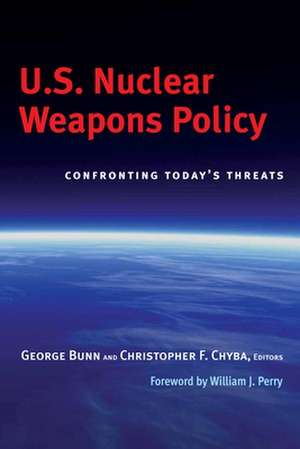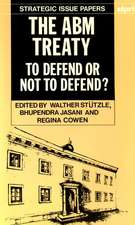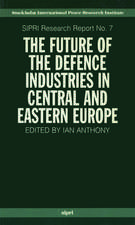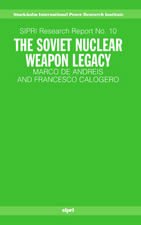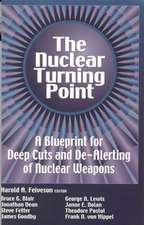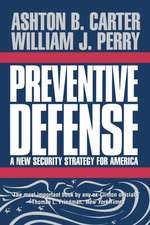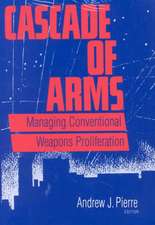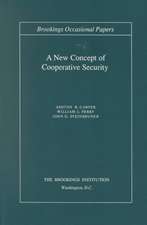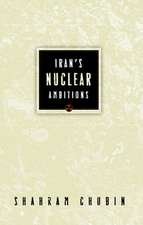U.S. Nuclear Weapons Policy: Confronting Today's Threats
Editat de George Bunn, Christopher F. Chyba Cuvânt înainte de William J. Perryen Limba Engleză Paperback – 30 aug 2006
What role should nuclear weapons play in today's world? How can the United States promote international security while safeguarding its own interests? U.S. Nuclear Weapons Policy informs this debate with an analysis of current nuclear weapons policies and strategies, including those for deterring, preventing, or preempting nuclear attack; preventing further proliferation, to nations and terrorists; modifying weapons designs; and revising the U.S. nuclear posture. Presidents Bush and Clinton made major changes in U.S. policy after the Cold War, and George W. Bush's administration made further, more radical changes after 9/11. Leaked portions of 2001's Nuclear Posture Review, for example, described more aggressive possible uses for nuclear weapons. This important volume examines the significance of such changes and suggests a way forward for U.S. policy, emphasizing stronger security of nuclear weapons and materials, international compliance with nonproliferation obligations, attention to the demand side of proliferation, and reduced reliance on nuclear weapons in U.S. foreign policy.
Preț: 271.85 lei
Nou
Puncte Express: 408
Preț estimativ în valută:
52.03€ • 56.54$ • 43.74£
52.03€ • 56.54$ • 43.74£
Carte tipărită la comandă
Livrare economică 21 aprilie-05 mai
Preluare comenzi: 021 569.72.76
Specificații
ISBN-13: 9780815713654
ISBN-10: 0815713657
Pagini: 360
Ilustrații: black & white illustrations
Dimensiuni: 152 x 229 x 21 mm
Greutate: 0.49 kg
Editura: Brookings Institution Press
Colecția Brookings Institution Press
ISBN-10: 0815713657
Pagini: 360
Ilustrații: black & white illustrations
Dimensiuni: 152 x 229 x 21 mm
Greutate: 0.49 kg
Editura: Brookings Institution Press
Colecția Brookings Institution Press
Notă biografică
Edited by George Bunn and Christopher F. Chyba - Foreword by William J. Perry
Descriere
A Brookings Institution Press and the Center for International Security and Cooperation publication
What role should nuclear weapons play in today's world? How can the United States promote international security while safeguarding its own interests? U.S. Nuclear Weapons Policy informs this debate with an analysis of current nuclear weapons policies and strategies, including those for deterring, preventing, or preempting nuclear attack; preventing further proliferation, to nations and terrorists; modifying weapons designs; and revising the U.S. nuclear posture.
Presidents Bush and Clinton made major changes in U.S. policy after the Cold War, and George W. Bush's administration made further, more radical changes after 9/11. Leaked portions of 2001's Nuclear Posture Review, for example, described more aggressive possible uses for nuclear weapons. This important volume examines the significance of such changes and suggests a way forward for U.S. policy, emphasizing stronger security of nuclear weapons and materials, international compliance with nonproliferation obligations, attention to the demand side of proliferation, and reduced reliance on nuclear weapons in U.S. foreign policy.
What role should nuclear weapons play in today's world? How can the United States promote international security while safeguarding its own interests? U.S. Nuclear Weapons Policy informs this debate with an analysis of current nuclear weapons policies and strategies, including those for deterring, preventing, or preempting nuclear attack; preventing further proliferation, to nations and terrorists; modifying weapons designs; and revising the U.S. nuclear posture.
Presidents Bush and Clinton made major changes in U.S. policy after the Cold War, and George W. Bush's administration made further, more radical changes after 9/11. Leaked portions of 2001's Nuclear Posture Review, for example, described more aggressive possible uses for nuclear weapons. This important volume examines the significance of such changes and suggests a way forward for U.S. policy, emphasizing stronger security of nuclear weapons and materials, international compliance with nonproliferation obligations, attention to the demand side of proliferation, and reduced reliance on nuclear weapons in U.S. foreign policy.
